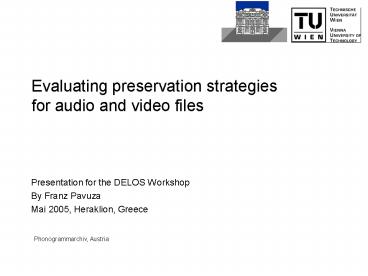Evaluating preservation strategies for audio and video files PowerPoint PPT Presentation
Title: Evaluating preservation strategies for audio and video files
1
Evaluating preservation strategies for audio and
video files
- Presentation for the DELOS Workshop
- By Franz Pavuza
- Mai 2005, Heraklion, Greece
Phonogrammarchiv, Austria
2
Audio and Video Files
- Homogenuous collection
- Few file formats
- Software migration often combined with hardware
migration - Very large collections
Source VUT
3
Evaluating preservation strategies
- Introduction
- Adapted Utility Analysis
- Set objectives
- Evaluate alternatives
- Define preferences and decide
- Summary
Source VUT
4
Utility Analysis
- Developed in the 1970s
- Applied mainly for infrastructure projects, such
as dams, bridges, neighbourhoods - Well expandable
- Adapted to fit the preservation requirements
Source VUT
5
Utility Analysis procedure
Assign effects to the objectives
Measure alternatives performance
Define alternatives
Define project objectives
Aggregate partial and total values
Transform measured values
Rank the alternatives
Weight the objectives
Source VUT, Hanusch et. alt.
6
Define project objectives
Source VUT
7
Assign effects to objectives
Measurable effects for example in frames per
second, EURO per year, Megabyte,
Subjective evaluation Valued with subjective
impression, necessary, where no measureable
evaluation found, for example usability (example
time to understand the system,..) or
watermarking. An extreme form is a simple yes/no
decision.
Source VUT
8
Definition of alternatives
- Migration Standardisation
- Emulation Encapsulation
- Computer Museum
- Digital Tablet
- No change to the strategy
- No preservation effort
- Migrate documents to
- U-Matic
- MPEG
- DPS
- Std.DV
- ..
- Encapsulate digital objects
- Try to preserve the hardware
- environment
- Try to construct a digital tablet
- Do not adapt the strategy
- Do not take care of preservation
Source VUT
9
Alternatives evaluation
- Measure of the alternatives performance, using
either - Original files
- Files from a testbed
Std. DV Digi- Beta PAL- VHS SVHS U-Matic Beta Cam MPEG NTSC- VHS DPS Hi8
Signal representation (e.g. RGB, ..) 5 5 1 2 1 5 2 1 5 2
Replay variance 5 5 3 4 5 5 5 5 5 4
Picture-audio synchronisation 5 5 5 5 4 5 5 5 5 3
Stereo 5 5 4 4 4 4 5 5 5 1
Source VUT
10
Transform measured values
- Define the transformation table
5 4 3 2 1 N.A
Replay variance 5 4 3 2 1 0
Picture-audio synchronisation 5 4 3 2 1 0
Frame rate gt80fps 80-50fps 50-30fps 30-20fps 20-10fps lt 10fps
- Transform the results to make them comparable
PAL-VHS SVHS U-Matic Hi8
Replay variance 3 4 5 4
Picture-audio synchronisation 5 5 4 3
Frame rate 5 5 5 5
Source VUT
11
Weighting
S(w1,j) 1
Appearance 0,5 0,45 0,225
Structure 0,5 0,45 0,225
Behaviour 0,5 0,10 0,05
S(leaf weights) 1
Source VUT
12
Aggregating part values
- Part values per objective
leaf weights x transformed values
- Total value per alternative
sum of all part values of a strategy includes
also not acceptable alternatives
Source VUT
13
Results
- Minimal difference in measurement
- Process characteristics costs are almost
identically - Significant difference in file characteristics
- Best solution (DPS) reaches 63 of an optimal
solution
DPS
DPS 3,17
Std. DV 3,16
Beta Cam 3,16
Digi-Beta 3,15
NTSC-VHS 3,14
SVHS 3,10
MPEG 3,10
U-Matic 3,09
PAL-VHS 3,05
Hi8 2,98
Source VUT
14
Summary
- Composition of objective trees depend strongly
on the collections requirements - Different solutions vary mainly in the objective
tree composition and the objectives weights - standard objective trees evolve for specific
scenarios - We now have
- A powerful tool to make accountable preservation
decisions - Detailed objective tree for audio / video
preservation - Decision process is transparent
Source VUT

